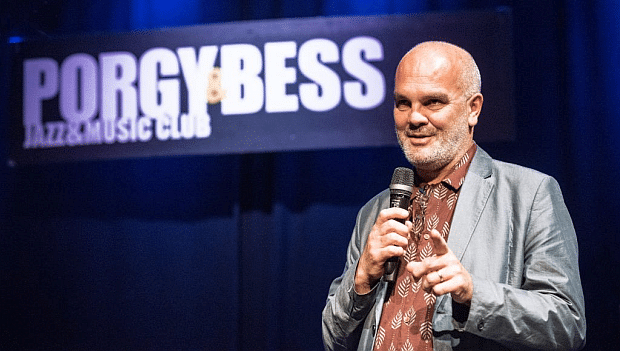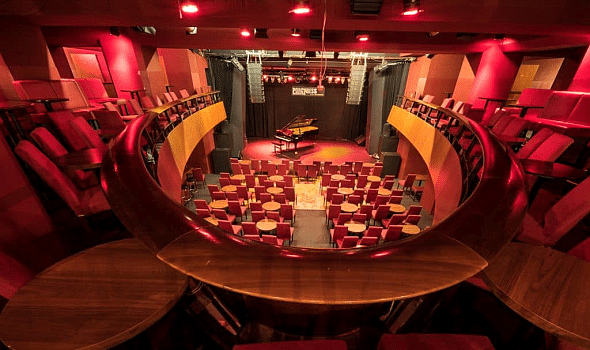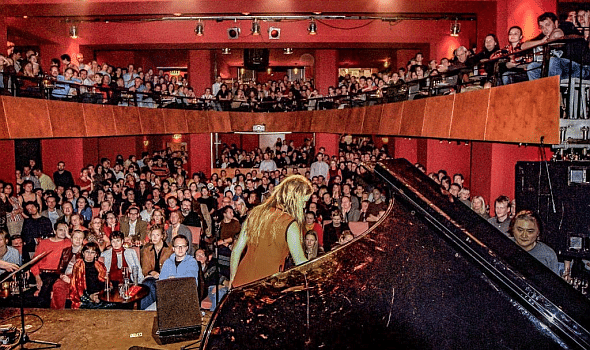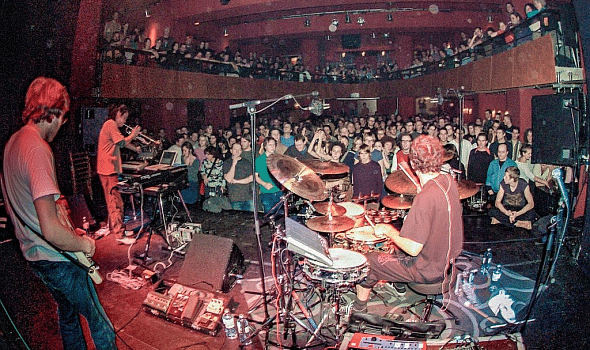
CHRISTOPH HUBER has dedicated half of his life to Vienna´s PORGY & BESS. The artistic director has played a major role in turning the club into an institution of international standing. In 2018 the club celebrated its 25th anniversary. For the occasion, CHRISTOPH HUBER recalled the initial challenges in a conversation with Martin Schütz, providing us with a look behind the scenes.
“INTERESTING ARE THE QUALITY, THE INNOVATIVE CONTENT AND THE POSSIBILITY OF FURTHER DEVELOPMENT”
25 years of Porgy & Bess Jazz & Music Club. That means hundreds – no thousands – of concerts. With such a history, how difficult was it to fulfil one or other of those special musical birthday wishes?
Christoph Huber: That was a certain challenge, especially since we always did something special on all the bigger birthdays. To celebrate our 20th birthday we organized a three-day street jazz festival with the founding members of Porgy & Bess. For the 15th birthday there was a specially curated festival too. We have also published special publications for these occasions. But this year, I decided against a festival for several reasons. Instead, we have been running the entire season under the motto, “25 years of Porgy & Bess”, realizing various special projects throughout the year that we probably wouldn’t have normally done. These include, for example, the four-dayJohn Zorn Project in November. Furthermore, Abdullah Ibrahim has been invited for the occasion of the 25th anniversary, and will most likely play a concert in early 2019. And on the exact birthday, September 26th, we had Martial Solal as our guest. This decision was quite risky due to his age and the fact that he rarely performs live anymore. But looking back it was the right decision and an incredibly good concert.
The club is located on Riemergasse 11 in Vienna’s first district, a place that had a reputation even before the arrival of Porgy & Bess, and looks back on an eventful history – from theatre to erotic cinema. What changes did the premises have to undergo in order to meet the acoustic and infrastructural requirements for such a concert venue?
Christoph Huber: That was both complicated and simple. It was complicated because we had to implement an elaborate and risky room-in-room concept for the purpose of sound insulation, so that the residents of the building were not disturbed by the concerts. On the other hand, it was easy because there was no other way anyway! Besides, the venue was in an absolutely desolate state. So we tore everything out, and with a lot of material that absorbs the vibrations without passing them on to the masonry, built the room-in-room around this concrete skeleton. That was a big risk, of course, because if there had been sound bridges, they would have been hard to find. If, as a result, there had been frequent problems with the neighbours, the whole thing could have been completely aborted.

In the beginning there were problems with residents, because there was nothing going on around this neighbourhood. In the meantime though, this has largely subsided. Nevertheless the renovation was a really big project and a huge risk, knowing that the budget was very tight. In other words, we had hardly any financial leeway, but as an association we set aside 10 million schillings for it, which accounted for about one third of the budget. The rest was taken on by the city and, for the most part, the federal government. And then to my amazement and my great joy, it actually worked out. We were very relieved; especially as such a renovation is very difficult to calculate, as you may be confronted with many unforeseeable problems during the work. But it all fits, and the infrastructure is still in an almost impeccable condition.
Porgy & Bess did not start in autumn 1993 at its present location, but in the former Fledermaus-Bar in Spiegelgasse. What was the initial situation and motivation 25 years ago that led to the founding of the club?
Christoph Huber: Mathias Rüegg organized a Jazzherbst in 1993 and was looking for a venue for it. This was the former Fledermaus-Bar – also a place steeped in history. The idea at that time was to organise a festival focusing on Austrian and Swiss musicians. Mathias then renamed the place Porgy & Bess for a limited time of three months, but was already thinking about staying there. So he initiated and founded it. Gabriele Mazic took care of the finances at the time and, as the longest serving member of the management board, is still responsible for commercial management in this regard. The wish developed to establish it as a regular club beyond this Jazzherbst, for which Mathias then looked for partners. And so, after getting to know each other through the Jazzfestival Saalfelden, Renald Deppe (who organized the Kulturspektakel – a kind of off-stage in the contemporary scene on Kirchengasse in Vienna) and I joined in.
In late autumn that year, the four of us founded the association Porgy & Bess and after the Jazzherbst we started developing the programme for Porgy & Bess. And then, of course, we also had to take care of the financing, which was a difficult task initially. But after a certain back and forth it was clear that we would receive a grant that covered one third of the total budget at that time. The city in particular, assumed it would all be history after a year anyway. Fortunately however, they were wrong! And that’s how it all started – although right from the start we had to struggle to build an audience. But then there were a few projects that filled the seats well and got the ball rolling.
“WE INTRODUCED THE MEMBERCARD RELATIVELY EARLY, IN 1994 […]”
The MemberCard was introduced quite early as a kind of annual subscription for the concerts, right?
Christoph Huber: Exactly. We introduced the MemberCard relatively early, in 1994, which was certainly the most significant development and the most important innovation during the club’s initial phase. If someone bought this ticket – we handed it out at the beginning of the season – they could attend all the concerts without having to pay extra admission. This concept proved itself early on, and the cards sold very well. From that moment on there were no more empty concerts, as there was always at least a certain number of MemberCard holders, and therefore an audience, there.
At the same time, it also made better budget planning possible.
Christoph Huber: That’s true. But this had also been difficult in the relatively small venue in the Spiegelgasse, when suddenly no box office was possible for more prominent names because the club was completely filled with MemberCard people. But that was okay anyway, because with this concept we had a guaranteed source of income. Another advantage is the fact that there is always an audience at the venue, even with lesser-known acts. And this concept, slightly adapted, has been with us all these years. The MemberCard is still available and still works splendidly.
It is also interesting how differently this offer gets approached. There are people who visit concerts almost daily with their MemberCard and people who buy the card out of solidarity but almost never come to the club. There are many different patterns of behaviour among the owners of the MemberCard. The nice thing for us is that about 90 percent of the members continue to purchase their tickets for the following season and we already have people on the waiting list for the remaining ten percent. There are already cases in which people return the card at some point due to changed life circumstances or interests. However, I don’t know of anybody who returned the card because they were dissatisfied with the offer.
This concept is also interesting because of the sheer number of concerts.

Christoph Huber: Yes exactly. There are people who don’t even look into the programme, but simply come to the concerts. And if it doesn’t fully meet their personal taste, they simply go home again. But people don’t get annoyed because they didn’t pay a separate admission fee for this particular concert. But by buying a ticket they help finance a large number of concerts throughout the year in advance. People know that this ticket offers free access to all concerts organized by Porgy & Bess. Only at expensive concerts have we introduced a surcharge for seats. But people have absolute understanding for that. They also understand that there are also external events where there is no free admission, but possibly only a reduction. It’s all working smoothly and that’s why we’re going to stick to it.
“BUT SOMEONE WHO MAKES SUCH MUSIC PROBABLY CAN’T BE A SIMPLE HUMAN BEING EITHER.“
Let’s take a quick look back. What or who was the loudest band in the 25-year history of Porgy & Bess?
Christoph Huber: In the old club we once had a concert with a project by Elliott Sharp, where my sound engineer measured 120 dB near the mixing console. And in the new club there were a few loud concerts, like for example that of Living Colour. For certain forms of music, a certain volume is necessary, but I’m not generally a fan of high volumes.
…the artist with the greatest ego?
Christoph Huber: Cecil Taylor, for example, was an artist with whom I always had a hard time – difficult in every respect. But someone who makes such music probably can’t be an easy person either. The beauty of jazz is also that an extraordinary degree of affectations or divaesque attitudes is rather the exception.
…the longest concert?
Christoph Huber: We once wanted to do a 24-hour project with the music of Erik Satie, but then we discarded it. We then however, went through with a concept where we presented Viennese songs for 24 hours. In the end it was 25 hours because we’d miscalculated.
… the highest number of musicians on stage at the same time?
Christoph Huber: Several years ago there was the final concert of a stage band, the Takon Orchestra, in which more than 40 musicians were on stage at the same time.
Who is still missing from the long list of artists who have been on stage at Porgy & Bess so far?
Christoph Huber: There are a lot missing. Sometimes just because of bad luck. Ornette Coleman was an artist whom I would have liked to have had in the club and who I was very close to. I was very sure he was going to come, but since this was linked to another engagement at a festival in Warsaw and the festival was cancelled, the concert didn’t happen here either. Then I would have liked to have Charlie Haden in the club too. But on the very day that we received the signed contract by post, an e-mail message arrived in which he explained that he could not play due to back problems. Among the really big names of great artists who are still alive I really regret having Wayne Shorter on the list. And there are a handful of crossover artists who would interest me, such as Tom Waits, who would fit perfectly into the club.
The list of the world’s best venues, published by the legendary US jazz magazine DownBeat, regularly includes the name of Porgy & Bess, as well as words of praise from the artists. What is the basis for this good reputation the club has long enjoyed beyond the borders of Austria and Europe?
Christoph Huber: It’s all because of the musicians. It is very important that they are treated with respect, which is not always related only to money. We can neither pay the highest fees nor offer the most luxurious hotels. But we always try to work eye-to-eye with the artists. We take great care to ensure that the artists are well accommodated, that the infrastructure is right and that there is always a good sound engineer on site. We also have a good layout and an excellent piano. These are five basic parameters that are very important. As long as the musician feels valued, a lot of other things no longer carry as much weight. This also includes being transparent and reliable in the cooperation by keeping to agreements and not making false promises. If you take this to heart and try to strive for the best within the given possibilities, you are on the right path. Of course we are very happy when musicians feel at home when they visit Porgy & Bess again, but this attitude is always the same towards all musicians.
Sometimes I pick up the musicians personally, which always makes them very happy. It’s not work, it’s a gesture, and such gestures are relevant and valuable. It’s for these reasons that people speak highly about Porgy & Bess. This also creates a snowball effect. If the musician feels comfortable, he or she will probably also play a good concert that will thrill the audience – and that’s the nicest thing that can happen. The reason why we are mentioned in DownBeat, for example, results from the fact that many musicians who have played with us have a good opinion of the club and that word gets around at some point.
“I AM ALSO OF THE OPINION THAT IT IS AN OBLIGATION TO PRESENT THE YOUNG EUROPEAN SCENE […]”
At Porgy & Bess you can experience live music almost every day of the year. According to the activity report, in 2017 the club’s main room alone was used on 332 days, with ticket sales accounting for the lion’s share of the budget. Against this backdrop, how can a club sustainably assert itself in a city with such a rich cultural offering on the one hand, and on the other hand offer a programme that not only relies on big names, but also stands out for its quality and complexity, and sometimes even challenges itself?
Christoph Huber: 14 to 15 percent of the total budget is covered by subsidies. That is not a lot, but we must be thankful that we still get public money. But most of it we actually have to set up ourselves. There’s been no main sponsor for a few years, about which there isn’t much we can do. We have to compensate for that, and I’m afraid that’s an unfair game because one can only compensate by increasing the admission prices and lowering the fees. And then you have to calculate carefully. This is essentially at the expense of the musicians, although they are still doing relatively well in our club since our system is based on the fact that we adjust the fee when many people come to the concert. This is something that the musicians always note positively when they get a higher salary without having asked for it. But of course we have to look at minimizing the financial risk, and the only way to do that is to negotiate at the level of fees. You have to keep it open at the top for the sake of fairness, so that when a lot of people come there is some kind of bonus. In the end, not much has changed for the musicians, because musicians who bring in more people get a correspondingly higher fee, and those who bring fewer people still get the agreed fixed amount.

I also think that we have an obligation to present the young European scene – even if at the beginning it is financially unsuccessful. But here you can actually take any young musician as an example: it has always been difficult at the beginning. But it’s right to hold on to them, and at some point it works out – not for everyone, but for many.
This means that the task of accompanying and developing artists in the longer term, which used to take place to a certain extent in the recording industry, is now becoming one of the tasks and responsibilities of the club?
Christoph Huber: Absolutely. The club in particular plays a special role and offers different possibilities compared to something like a festival. Against this background, for me personally dealing with it daily, promoting and supporting it, has a much greater relevance than a festival that you prepare for a whole year, and which is then over again after three days. Our “Strenge Kammer” is also very interesting, but it can only function in the particular context and framework in which it is embedded. And the “Strenge Kammer” – excellently curated by one of the founding members, Renald Deppe – is, for example, something that we regard as our responsibility and consider relevant. We see such things as an obligation within our responsibility.
In addition to Porgy & Bess’ many self-promoted events, the club also cooperates with local actors – such as this year’s Wien Modern – and makes its premises available to external organisers such as Jeunesse and the Vienna Songwriting Association, which recently organised the Blue Bird Festival. To what extent do economic aspects, as well as considerations of audience development and an extended range of programmes projected onto the club, come into play?
Christoph Huber: Of course there is an economic side to this – that is clear. Whereby decisions about external productions are based strictly on the contents and not about the money. I always have the right of veto with all these things, of which I sometimes – although not very often – make use. And of course there are interesting cooperations. The Jeunesse, for example, has a jazz cycle, and Porgy & Bess is the perfect venue. At with Wien Modern I was very pleased that this collaboration has now been intensified, for example by concluding this year’s festival with a concert by the London Jazz Composers Orchestra at Porgy & Bess. I think that’s great.
Does it then become apparent that another audience is coming through the door and discovering the club for itself?
Christoph Huber: Yes, of course. That’s why we also do children’s theatre in the afternoon, for example. But of course, that’s relevant. Because through our cooperations with Barracuda Music, Jeunesse or Wien Modern, for example, we also get different people into the club whom we might otherwise not be able to reach. On the other hand, when the club moved from Spiegelgasse to Riemergasse, we had the situation that we moved from a room with capacity for 100 people to a room with capacity for 400 people, without changing the concept. So we developed a strategy to open the space for clubbing, which was still hip at the beginning of the 2000s, in order to reach a different audience. We have stopped doing this, but that was not unimportant despite the tensions that it also created. It is of course relevant to address new segments of the public, especially those we can no longer reach from our immediate environment. Such cooperative events are great for that.
A pluralistic programme can be found as a keyword right at the beginning of the self-description on the club website. Jazz in many of its facets, but also other types of music, are represented on stage, and both the domestic scene and international projects are brought into focus by artists from Europe and overseas. Was that always the plan or is it one that has only developed over time? And how is it possible over the years and many, many concerts to maintain this openness and balance the different perspectives and demands?
Christoph Huber: I must confess that we are not pursuing a particular strategy now, even though it was clear to us from the outset that we don’t want to be a purist jazz club that views this dogmatically. Hence our name, which fortunately didn’t come from me, but from Mathias Rüegg, includes the subtitle, “Jazz & Music”. That’s what this is about. Jazz is at the centre., while the “& Music” means there are other genres of interest, which we don’t want to define at all. interest. In the mid-1990s for example, we were working in the emerging field of electronica. Now we are dealing with singer-songwriters. That wasn’t the case before, but it fits well into the room and well into the concept.
The only question that arises is a question of size – quality, innovative content and the possibility of further development are important for us. This is however, independent of the genre. It doesn’t matter whether it’s jazz, new music, electronic music, modern folk music, or whatever else there is. But there are also things that are mutually exclusive. We’re not going to do hard rock, pop or classical music. Porgy & Bess is not needed for this, because there are other rooms for it. Conversely, this also means that the programme is defined – quite pragmatically – by the fact that this would not be possible, or only with difficulty, anywhere else. In this respect I live quite well with it and don’t worry too much about it. But I’m also aware of one thing: if I only did what I personally really, really liked, we would’ve gone bankrupt long ago. But I have no problem with that and have to admit that I have become much more musically tolerant with time . But now it doesn’t matter what the scene is called, because they all play at a high level. I am especially impressed by the moment when musicians presents themselves on stage. You have to create good conditions so that musicians feels comfortable on stage, and can present their best. And they can only do that if the corresponding basic prerequisites are met. That’s the core aspect. Everything else is secondary.
Many thanks for the interview!
Martin Schütz – translated from the German original (mica – music austria).
Links:
Porgy & Bess (website)
Porgy & Bess (facebook)
Jazz from Austria (article & brochure)
